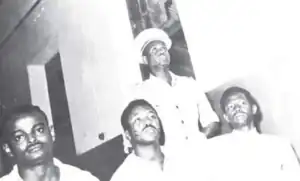1959 Sudanese coup attempt
On 9 November 1959, a group of military officers attempted a coup to overthrow Lieutenant General Ibrahim Abboud and his ruling military council. The officers involved in the coup were Binbashi Ali Hamid, Abd al-Badi Karrar, Yuzbashi Sadiq Muhammad Hassan, Binbashi Yaqoub Kabeida, Saag Abd al-Rahman Kabaida, Yuzbashi Abd al-Hamid Abd al-Majid, Yuzbashi Muhammad Mahjoub Othman (brother of Abdel Khaliq Mahjub), and Abdel-Moneim Mohamed Othman. The Yuzbashi Abdullah Al-Taher Bakr, Yuzbashi Bashir Muhammad Ali, and First Lieutenant Muhammad Jabara were also involved. Al-Rashid Al-Taher Bakr, a leader of the Muslim Brotherhood movement in Sudan, was part of the plan as well.[1][2][3] The coup plan was leaked, and the military leadership was aware of the plot and closely monitored the officers involved. The coup attempt failed as the officers were arrested without any resistance.[1] Subsequently, trials took place, attracting significant public attention. Some prominent lawyers, including Muhammad Ahmed Mahjoub, Ahmed Suleiman, Ahmed Zain Al-Abidin, Mansour Khaled, Anwar Adham, and Kamal Ramadan, defended the officers.[4]
| 1959 Sudanese coup attempt | |||||||
|---|---|---|---|---|---|---|---|
| Part of the First Sudanese Civil War and the Arab Cold War | |||||||
 Conspirators at fails | |||||||
| |||||||
| Belligerents | |||||||
|
| ||||||
| Commanders and leaders | |||||||
|
President of Sudan | |||||||
After 41 days of trials, the military court handed down verdicts. The court sentenced Binbashi Ali Hamid, Yuzbashi Abd al-Hamid Abd al-Majid, Binbashi Yaqoub Kabeida, Saag Abd al-Badi Ali Karrar, and Yuzbashi Sadiq Muhammad Hassan to death by hanging. Muhammad Mahjoub Othman, Saag Abd al-Rahman Kabeida, and Yuzbashi Abdullah al-Taher Bakr received life imprisonment and expulsion from the army. First Lieutenant Muhammad Jabara was sentenced to 14 years in prison, and Al-Rashid Al-Taher Bakr was sentenced to 5 years in prison.[1][2]
Lieutenant General Abboud ratified the verdicts, leading to the execution of the officers on 20 December 1959 at Kobar Prison, with the bodies of the officers handed over to their families for burial.[5][6] The coup attempt and subsequent executions were significant as they marked the first execution in the history of Sudan's armed forces after independence.[6] Major General Mahmoud Qalandar, speculated that the method of execution, hanging instead of firing squad, was chosen to avoid potential complications in the ranks caused by soldiers' strong loyalty to their officers, which could lead to inaccurate shots.[4][6]
Abd al-Rahman Kabeida, who was also involved in the 1957 Sudanese coup d'état attempt,[7] remained imprisoned until his release after the October 1964 Revolution. He later became the General Director of the Sudanese Tourism Corporation.[8]
References
- "الحكومة العسكرية في السودان في الأعوام الثلاثة الماضية (1959 – 1961م) .. بقلم: بيتر كيلنر .. ترجمة: بدر الدين حامد الهاشمي". سودانايل (in Arabic). 2023-05-13. Retrieved 2023-07-30.
- Kilner, Peter (1962). "Military Government in Sudan: The Past Three Years". The World Today. 18 (6): 259–268. ISSN 0043-9134. JSTOR 40393412.
- العزاوي, قيس جواد (2023-03-02). الجيش والسلطة في التاريخ العثماني (in Arabic). ktab INC.
- Al-Sayegh, Bakri (2011-11-12). "انقلاب 9 نوفمبر 1959..علي انقلاب 17 نوفمبر 1958" [The November 9, 1959 coup..the November 17, 1958 coup]. Alrakoba.
- "حي "كوبر" وسجنه... مكان سكنى البشير حاكما ومعزولا". اندبندنت عربية (in Arabic). Retrieved 2023-07-30.
- Al-Sayegh, Bakri (2013-11-09). "9 نوفمبر1959: انقلاب علي حامد..واول اعدامات بالقوات المسلحة" [November 9, 1959: Ali Hamed's coup...and the first executions in the armed forces]. Alrakoba.
- "تاريخ الانقلابات العسكرية في السودان منذ الاستقلال". BBC News عربي (in Arabic). Retrieved 2023-07-29.
- Al-Sayegh, Bakri (2023-05-09). "انقلابات وخيانات وخبيثات الضباط في بعضهم البعض داخل القوات المسلحة – البرهان "حميدتي" مثالآ-" [Coups, betrayals and maliciousness of officers against each other within the armed forces - Al-Burhan “Hemedti” for example]. Alrakoba.